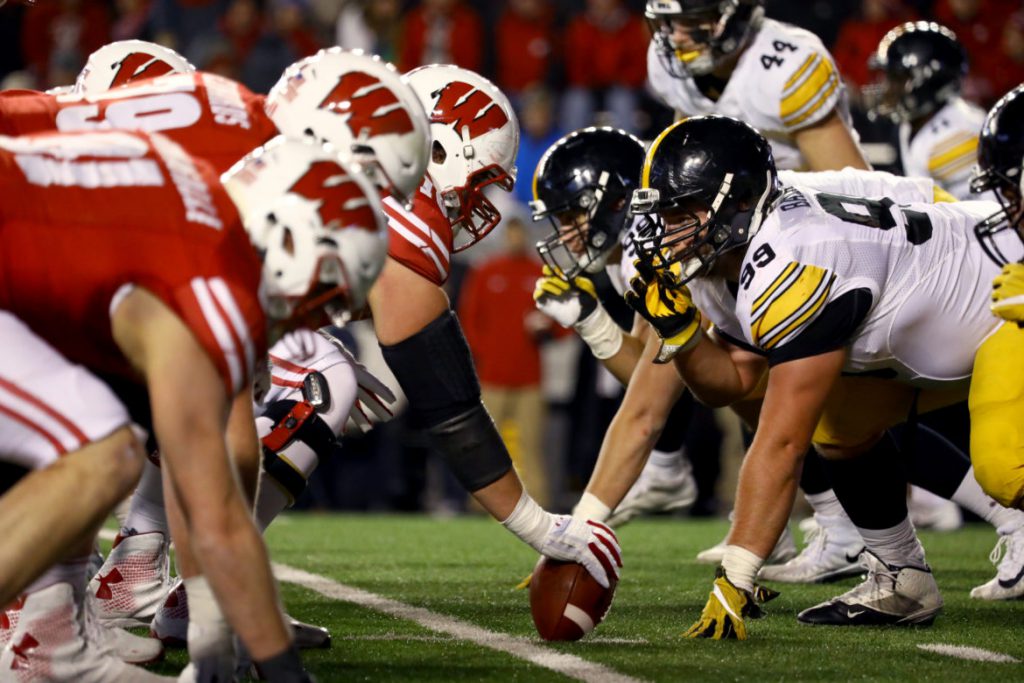How to Reduce Brain Injures
Research indicates college football players only report 1 in 20 concussions.

Interviews with more than a dozen current and former Badger football players reveal that many downplay the threat of brain injury, even though some said they have had their “bell rung” many times. Here, the Badgers’ play against Iowa on Nov. 11, 2017, in Madison. Dee Warmath, assistant professor and principal research scientist in the School of Human Ecology, is leading a study that tests different forms of concussion education on club sport athletes at UW — many of whom do not receive the same level of information about concussions. Photo by Brad Horn/For the Wisconsin Center for Investigative Journalism.
A University of Wisconsin-Madison researcher is examining ways to improve athletes’ reporting of brain injuries — a key to preventing long-term neurological damage.
Dee Warmath, assistant professor and principal research scientist in the School of Human Ecology, is leading a study that tests different forms of concussion education on club sport athletes at UW.
Warmath said these athletes were chosen because while they play competitive sports, they are not inundated with concussion education.
The challenge is significant. A Wisconsin Center for Investigative Journalism report published in January found that many players may fail to report symptoms of brain injury.
In the story, interviews with more than a dozen current and former Badger football players revealed that many downplay the threat of brain injury, even though some said they have had their “bell rung” many times.
Currently, college athletes are given a fact sheet and a presentation on symptoms of concussion and the importance of reporting those symptoms to coaches and trainers. Despite this, research from 2014 suggests only one in 20 concussions gets reported.

Dee Warmath, assistant professor in the University of Wisconsin-Madison School of Human Ecology, is leading research designed to better educate student-athletes about concussions. “If you soften something, it won’t be taken as seriously,” she said. Photo from the UW-School of Human Ecology.
Warmath said the clinical language used by the current warnings may leave players confused.
“Maybe I listened to what you said, maybe I captured what you said, but I just don’t know what to do with the information,” Warmath said, describing student athletes’ reaction to the current education. “It’s just not personal to me. It is just something I don’t have the skill to understand.”
She also questioned whether the wording is explicit enough. Concussions and subconcussive hits have been linked to chronic traumatic encephalopathy and its potentially devastating impacts, whose symptoms include impaired judgment, mood swings, increased risk of suicide, Parkinson’s and dementia.
Although it does not specifically mention CTE, an NCAA concussion fact sheet for players states, “Athletes who have had multiple concussions may have an increased risk of degenerative brain disease and cognitive and emotional difficulties later in life.”
This danger has been known for decades. An NCAA medical handbook from 1933 warns of the long-term dangers of repeated blows to the head.
“The actual loss of consciousness occurs only in more serious concussions,” the handbook stated. “Dizziness or a sense of ‘daze’ is common in slight cases.”
It also explained how the condition of being “punch drunk” was “definitely a condition … and often recurrent concussion cases in football and boxing demonstrate this.”
Warmath said today’s student-athletes need to be told in plain language about the dangers of brain injury.
“How you say things matter,” she said. “If you soften something, it won’t be taken as seriously. If you want people to listen, you have to be willing to say what we know.”
Researchers are testing a new fact sheet and new education materials highlighting the negative consequences of failing to report a concussion, including “putting yourself at greater risk for dementia or other mental health problems later in life.”
Warmath said other messages being tested include: “If you choose not to report a concussion then you are potentially putting yourself at risk of death from a second concussion. You’re also potentially putting yourself at risk for not graduating or not getting the job you wanted or not being able to stay in a relationship.”
According to Warmath, the changes aim to push athletes towards higher rates of reporting injury. That approach has already showed some success. She said when exposed to the messages, athletes talk about concussion as something personal rather than something that is just “out there.”
Luke Schaetzel, a recent University of Wisconsin-Madison journalism graduate, is a freelance reporter based in Madison. Wisconsin Center for Investigative Journalism Managing Editor Dee J. Hall contributed to this report. The nonprofit Center (www.WisconsinWatch.org) collaborates with Wisconsin Public Radio, Wisconsin Public Television, other news media and the UW-Madison School of Journalism and Mass Communication. All works created, published, posted or disseminated by the Center do not necessarily reflect the views or opinions of UW-Madison or any of its affiliates. The Center’s collaborations with journalism students are funded in part by the Ira and Ineva Reilly Baldwin Wisconsin Idea Endowment at UW-Madison.
Countering Concussions
-
States Mull Ban on Tackle Football for Kids
 May 25th, 2018 by Luke Schaetzel
May 25th, 2018 by Luke Schaetzel
-
Former Badger With Brain Injury Suing NCAA
 May 21st, 2018 by Luke Schaetzel
May 21st, 2018 by Luke Schaetzel






















New BU data links micro trauma to the zygomatic bone to the development of CTE. NFL research on mouth guards steered to prove mouth guards have no effect on concussion, NFL allows players to participate without mouth protection, inadvertently shows some types of mouth guard designs are better at reducing trauma to the zygomatic bone. Research shows aligning and balancing the jaw bone in relation to soft tissue may be the key in designing a properly fit orthotic product. Yet their are no standards in place with the NFHS, NCAA, NFL, NHL ect. http://www.purepowermouthguards.com
Just say “no” to American football. That’s one way.
I think one way to reduce the amount of impact brain injuries is to reduce the amount of time between plays. If a play clock of about 25 seconds would start as soon as a play was blown dead, all players would have to rush towards the line of scrimage in order to be set form the next play. As a result, you would have smaller but more fit players, and less huge hits. Long plays would be the result of better conditioned players getting away from less fit players who were “gassed”
Simaillary, with less rest between plays, there would be lesser impact between offensive and defensive line men on each play as they would have less rest and less energy to fire out from the line. It still would be an unhealthy game for your brain, but I think it would reduce the stress on the brain impacting the skull
Want to reduce brain injuries? Stop listening to the chronic liars and schemers Trump and Career Politician Scott “been mooching off the Big Government his entire life” Walker.